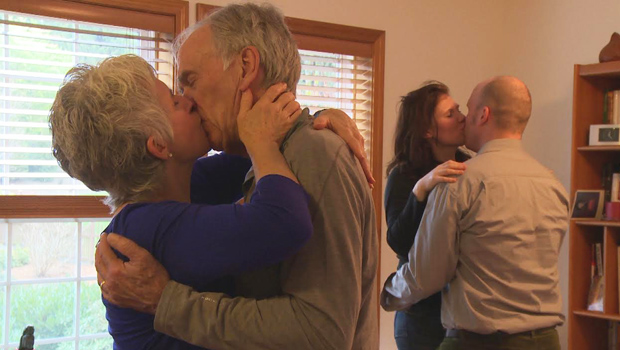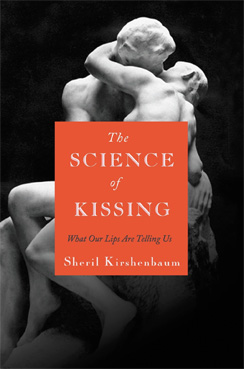The science of kissing
"Pucker Up" is what lovers do before indulging in a kiss. It's also part of the curriculum in the classroom our Faith Salie has visited:
No, these students are not "kissing up" for extra credit. This is a kissing school.
Couples come to holistic therapist Cherie Byrd in Seattle, Washington, for help putting some heat back in their relationships. And for Byrd, it all starts and ends with the humble kiss.
The first rule of kissing school: No pecks.
"Kissing is about intimacy," she told Salie. "Sex can be about a whole lot of other things. There are lots of different ways of being with people, and if you really want to be intimate, then kissing is a pathway for that. So I would highly recommend it as a primary engagement."
According to scientists, saying a couple has chemistry isn't just a cliché.
Most folks remember their first kiss better than they remember their first sexual encounter. (Source: Butler University Study by Professor John Bohannon)
"At the moment of a kiss, there's a very complicated exchange of information involving tactile cues and postural adjustments and odors and even the exchange of saliva," said Gordon Gallup Jr., an evolutionary psychologist at the State University of New York at Albany.
"There may be hard-wired, evolved mechanisms operating at an unconscious level that process these cues and make a determination about whether that's a good genetic match."
Kissing, Gallup says, is "very efficient," from an evolutionary point of view.
Whether we're aware of it, a kiss can be a litmus test (or LIP-mus test) for finding a mate.
Gallup has surveyed thousands of college students and he has found that a kiss on a first date can be the kiss of death.
About 2/3 of people tilt their head to the right when they kiss. Source: "Human Behavior: Adult persistence of head turning asymmetry," Nature (2003)
"What we discovered was that the vast majority of males and females, on one or more occasions, have found themselves attracted to someone only to discover, if they kissed them for the first time, that they're no longer interested," said Gallup.
"Oh, I know that feeling," said Salie.
"I know that feeling as well."
What interests experts about kissing is its seeming universality. It's estimated over 90 percent of human cultures around the world kiss as part of their courtship.
But the first example of a "kiss and tell" comes to us from ancient India.
The first literary evidence for kissing dates back about 3,500 years to India's Vedic Sanskrit texts, says scientist Sheril Kirshenbaum, who wrote the book on "The Science of Kissing" (Grand Central). "So we know people have been kissing, as we'd recognize it, for quite some time.
"But when we look at other species, when we look at bonobos or chimpanzees or other animals that do press their lips together, we get a sense that humans aren't alone in this kind of behavior. We've probably been kissing, in some way, for as long as we've been on Earth."
Although we almost all kiss, men and women do seem to kiss differently.
Males, said Gallup, "attempt to, more often than females, engage in open-mouth kissing with tongue contact. Open-mouth kissing with tongue contact is three times more likely to eventuate in sex than closed-mouth kissing."
Also, saliva contains trace amounts of testosterone. "This may raise testosterone levels on the part of the female that's in this committed relationship and, therefore, make her more receptive to sexual activity," he said.
Do you need another reason to swap spit?
"At the moment of a kiss, particularly if it's an open-mouth kiss, there's an exchange of bacteria between the participants," says Gallup. "As much as 80 million bacteria are exchanged between the two parties."
Catching someone's cooties can be a boon to your immune system! So it turns out that the kiss may be one of human history's most enduring love stories, and mysteries. Because as the scientists tell us, we still have a lot to learn about why a kiss isn't just a kiss.
Still, Gallup has one piece of advice for the lovelorn: "I'm tempted to say, if you kiss enough frogs, you'll eventually find a prince," he laughed.
For more info:
- kissingschool.com
- Therapist Cherie Byrd (thebyrdapproach.com)
- Gordon Gallup Jr., Professor of Psychology, SUNY Albany
- "The Science of Kissing: What Our Lips Are Telling Us" by Sheril Kirshenbaum (Grand Central); Also available in eBook format

